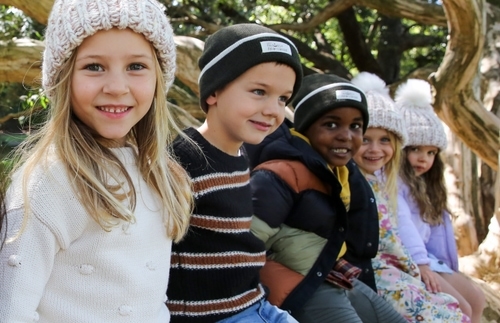
Partners in Paediatric Cancer Trials: Carrie’s Beanies 4 Brain Cancer
Supporting Paediatric Cancer Trials: The much-needed, and appreciated, role of ANZCHOG’s funding partners
Carrie’s Beanies for Brain Cancer
Friday 9 February 2024
It goes without saying that ANZCHOG’s vision of world class care for Australian and New Zealand children and adolescents with cancer relies on the support and cooperation of numerous organisations and individuals who share our commitment. As such, we thought it was high time that we highlighted how some of these special organisations support us, work with us and inspire us.
Today, we chat to one of our longer-term funders, Carrie’s Beanies 4 Brain Cancer (CB4BC), to find out more about how and why they support ANZCHOG’s clinical cancer trials for children. Many will know that CB4BC was established in honour of Carrie Bickmore’s late husband, Greg Lange, who tragically lost his life to brain cancer. Since its inception, Carrie’s Beanies 4 Brain Cancer has been focussed on supporting research specifically related to brain cancers, including a number of paediatric clinical trials conducted by ANZCHOG.
When we asked Sam McGuane, CB4BC Executive Director about why they’ve been involved with ANZCHOG, he told us, “We are searching for the best opportunities to accelerate discoveries that will impact brain cancer patients now while also finding the right strategy to build the knowledge for the future. We know that clinical trials are an incredible way to support patients and provide so much knowledge from these important clinical trials. We have enjoyed the partnership with ANZCHOG and the outcomes from some of the projects we’ve been able to fund together.”
But what’s been the biggest success story for the CB4BC-ANZCHOG collaboration from your perspective?
“Every trial that we open is a success. Every time we give a child who’s diagnosed with a rare and incredibly difficult cancer like brain cancer – the success is being able to have a trial open that is an option for them. This not only provides the patient and family with valuable hope and a clear focus on an outcome for the child, but it gives the research teams, clinicians and other support staff the opportunity to take the field forward through understanding of the outcomes of each trial.”
CB4BC has been established for a number of years now and has really made a difference in supporting innovative and promising research. What’s one thing you know now that you didn’t know then?
“We probably didn’t have enough knowledge of the environment that our researchers and clinicians operate in. The critically low funding pool leads to an incredible amount of time and energy wasted on having to apply for grants and gather enough money to do the work. We are focused on giving these people back time so that they can work on the problem.”
None of us knows what the future holds but do know that testing promising lab research via clinical trials is the way to make progress. What is your vision for the next ten years?
“In ten years’ time we would like to be able to say 3 things.
- We developed sustainable revenue to fuel our strategy.
- Through that, we have created a critical mass of highly productive and highly collaborative research teams in Australia that are partnering with the best in the world.
- We have a number of promising therapies – either in the clinic or in the market from the work that we are doing right now – that are making a difference to the QOL (quality of life) and long-term survival of brain cancer patients.”
CB4BC has supported some really progressive research. How do you choose which projects you support or initiate?
“Now that we have created The Brain Cancer Centre (BCC) all of the fundraising from CB4BC is directed to that vehicle. The BCC has a leadership structure and an independent research advisory board that helps to support the recommendations of leadership. We review and report to all of our stakeholders often to ensure that there is a high level of accountability.”
And finally, what is the message that Carrie’s Beanies 4 Brain Cancer wants to leave with our community today?
“It’s amazing what can be achieved when no one cares who gets the credit. Brain cancer patients (and their families) don’t care who solves it, where it’s solved, which institution…they just want it solved. If we truly share that vision from the perspective of the patient – we will proactively break down barriers to collaboration and fuel partnerships that drive outcomes.”
Thank you for speaking with us, Carries Beanies 4 Brain Cancer. We really couldn’t do what we do without the commitment of our funding partners so it’s great to hear a bit more about the motivation, collaboration and vision from the flip side of our clinical trials.
ANZCHOG is a non-profit organisation committed to ensuring Australian and New Zealand children receive world-class cancer care. We are the peak professional body for paediatric oncologists and health professionals who care for children with cancer, spearheading national initiatives to enhance clinical care through communication, research, networking and education. We are also the national cooperative clinical trials group for childhood cancer, actively working with trial consortia around the globe to ensure Australian and New Zealand children have the opportunity to access the latest promising cancer treatments.


